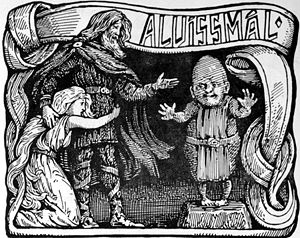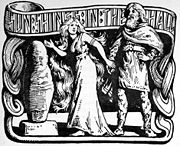
Alvíssmál
Encyclopedia


Poetic Edda
The Poetic Edda is a collection of Old Norse poems primarily preserved in the Icelandic mediaeval manuscript Codex Regius. Along with Snorri Sturluson's Prose Edda, the Poetic Edda is the most important extant source on Norse mythology and Germanic heroic legends, and from the early 19th century...
, probably dating to the 11th century, that relates a conversation between Thor
Thor
In Norse mythology, Thor is a hammer-wielding god associated with thunder, lightning, storms, oak trees, strength, the protection of mankind, and also hallowing, healing, and fertility...
and a Dvergr (dwarf) called Alvíss
Alvíss
Alvíss was a dwarf in Norse mythology.Thor's daughter, Þrúðr, was promised to Alvíss. However, Thor did not want Alviss married to his daughter, so he devised a plan to stop Alvíss from doing so. He told Alvíss that, because of his small height, he had to prove his wisdom. Alvíss agreed. Thor made...
("All-Wise").
Plot
Alvíss comes to Thor to claim Thor's daughter as his bride. The daughter had apparently been promised to him earlier. Thor refuses, since he wasn't home when the deal was done. He says Alvíss must answer any question Thor poses to win his daughter. The rest of the poem is mainly a list of comparative names for different entities among men, ÆsirÆsir
In Old Norse, áss is the term denoting a member of the principal pantheon in Norse paganism. This pantheon includes Odin, Frigg, Thor, Baldr and Tyr. The second pantheon comprises the Vanir...
, Vanir
Vanir
In Norse mythology, the Vanir are a group of gods associated with fertility, wisdom and the ability to see the future. The Vanir are one of two groups of gods and are the namesake of the location Vanaheimr . After the Æsir–Vanir War, the Vanir became a subgroup of the Æsir...
, giants, dwarves and elves
Elf
An elf is a being of Germanic mythology. The elves were originally thought of as a race of divine beings endowed with magical powers, which they use both for the benefit and the injury of mankind...
, which Alvíss dashes off in reply to Thor's questions. These terms presumably describes the character of their users, although a common denominator cannot easily be discerned. For example, the sky
Sky
The sky is the part of the atmosphere or outer space visible from the surface of any astronomical object. It is difficult to define precisely for several reasons. During daylight, the sky of Earth has the appearance of a pale blue surface because the air scatters the sunlight. The sky is sometimes...
has the following names, according to Alvíss:
|
|
Alvíss has the answer to every single one of Thor's questions, but he is nevertheless outwitted. When the sun finally rises at the end of the poem, Alvíss, being a dwarf, turns to stone as its rays strike him. It is the only episode on record where Thor outthinks his adversary. He usually relied on brute force.
There is no action in the poem, and it stands entirely on its own, but it does contain words not found elsewhere, some doubtless the creation of its poet.
English translations
- Alvissmol Translation and commentary by Henry A. Bellows
- Alvíssmál Bellows' translation with clickable names
- Alvíssmál Translation by Benjamin ThorpeBenjamin ThorpeBenjamin Thorpe was an English scholar of Anglo-Saxon.-Biography:After studying for four years at Copenhagen University, under the Danish philologist Rasmus Christian Rask, he returned to England in 1830, and in 1832 published an English version of Caedmon's metrical paraphrase of portions of the...
- Alvíssmál Translation by Benjamin ThorpeBenjamin ThorpeBenjamin Thorpe was an English scholar of Anglo-Saxon.-Biography:After studying for four years at Copenhagen University, under the Danish philologist Rasmus Christian Rask, he returned to England in 1830, and in 1832 published an English version of Caedmon's metrical paraphrase of portions of the...
- Alvísmál Translation by P. B. Taylor and W. H. AudenW. H. AudenWystan Hugh Auden , who published as W. H. Auden, was an Anglo-American poet,The first definition of "Anglo-American" in the OED is: "Of, belonging to, or involving both England and America." See also the definition "English in origin or birth, American by settlement or citizenship" in See also...
- Alvíssmál A Comparative Study
- Alvísmál Translation by Lee M. Hollander
- The Wisdom of Alviss Translation by A. S. Cottle
- The Wisdom of Alviss Translation by A. S. Cottle
Old Norse editions
- Alvíssmál Sophus BuggeSophus BuggeSophus Bugge was a noted Norwegian philologist and linguist. His scientific work was directed to the study of runic inscriptions and Norse philology. Bugge is best known for his theories and his work on the runic alphabet and the Poetic Edda and Prose Edda. -Background:Elseus Sophus Bugge was...
's edition of the manuscript text - Alvíssmál Guðni Jónsson's edition with normalized spelling
- Alvíssmál Guðni Jónsson's edition with normalized spelling

